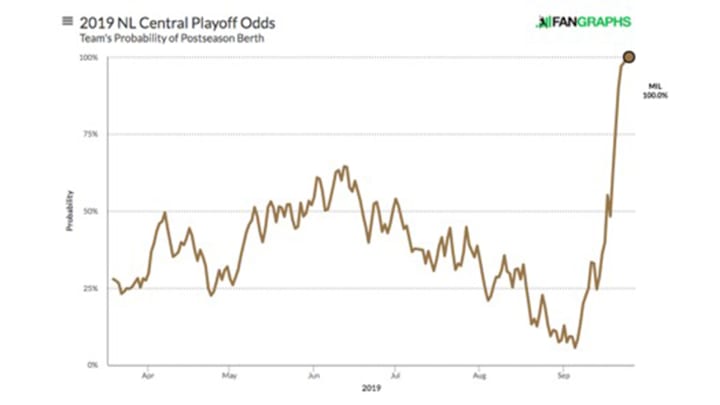Improved Pitching Is Fueling Brewers' Postseason Push Without Christian Yelich

September constitutes its own weird frame of reference for MLB—speed and distance are harder to accurately discern, everything passes too slowly or too fast, the stakes are either so high that you cannot look down or so low that the situation is all flattened out. The usual standards do not apply.
So, from the perspective of this late-season weirdness, when Christian Yelich fractured his kneecap on September 10, it seemed fairly clear: Milwaukee’s season was over. The Brewers would not return to the postseason for a second consecutive year. An extreme reaction to one injury? Sure. But the team was one game back of the second wild-card; Yelich was not only their best player, but arguably the best in the National League; and their proximity to a playoff spot had been possible only with an extreme hot stretch that seemed like it would be difficult to sustain even under the best of circumstances. Their remaining schedule was fairly easy (four of five series were against losing teams), but even so, there was no room for error; FanGraphs put their postseason chances at just 25%. The stakes were just too much, and Yelich was too good. There was too much time to fill. From this frame of reference, Milwaukee was, if not screwed, dangerously close to it.
But, of course, it wasn’t. The Brewers’ Wednesday win over the Reds clinched their postseason spot. Even without Yelich, they’re going back to October. They have not just survived the last two weeks. They’ve dominated them. Since Yelich’s injury, Milwaukee is 12-2, part of a greater run that’s turned on the strength of what was formerly their biggest weakness: In September, Brewers pitching has been crucial to their success.
Milwaukee’s staff has ranged from clear problem area (in the spring) to serious liability (early season) to, at best, simply fine (late summer). As a group, it’s never been a particular positive. And now?
ERA | K/9 | BB/9 | HR/9 | |
|---|---|---|---|---|
March—August | 4.68 | 9.1 | 3.6 | 1.4 |
September | 2.77 | 10.2 | 2.7 | 1.0 |
Of course, this doesn’t happen in a vacuum; the boost from that easy schedule can’t be overlooked. But it’s still an encouraging sign in a crucial area for Milwaukee. It includes the success of deadline acquisitions Jordan Lyles and Drew Pomeranz; the best run from Zach Davies since his electric April; the steadiest month yet for Chase Anderson and Gio Gonzalez; and a strong performance from Brent Suter in his return from Tommy John. And, meanwhile, Josh Hader has continued to be himself, which means that he’s still striking out more than sixteen batters per nine. In other words, Milwaukee’s success here has pulled from across the board, rotation and relief. The season-best monthly numbers have come from both units.
The Brewers’ pitching has been so good, in fact, that it’s been able to sustain a fairly flat offense. Milwaukee’s September OPS of .743 is its lowest monthly number of the year. (By OPS+, that’s a perfectly average 100, not anything to get concerned about but not anything to get excited over, either.) There have been positive points—Yelich’s replacement Trent Grisham has capably answered the call; Yasmani Grandal has been stellar, Ryan Braun has continued a strong second half—but, in all, the offense hasn’t been the driving force here. It’s been the pitching.
The September frame of reference can make it easy for any of this to be skewed—to believe that there’s nothing to worry about on this staff anymore (no), or to see a thousand new worries (also no), or to think either that this run has been so good that it couldn’t possibly end here or that it’s been so good that it must end here. This, at least, is clear: The Brewers’ postseason odds have proceeded like a roller coaster that only goes up, and now, at last, they’re on top.

It can be hard to judge much of anything from up there. But it’s certainly a nice place to be.
